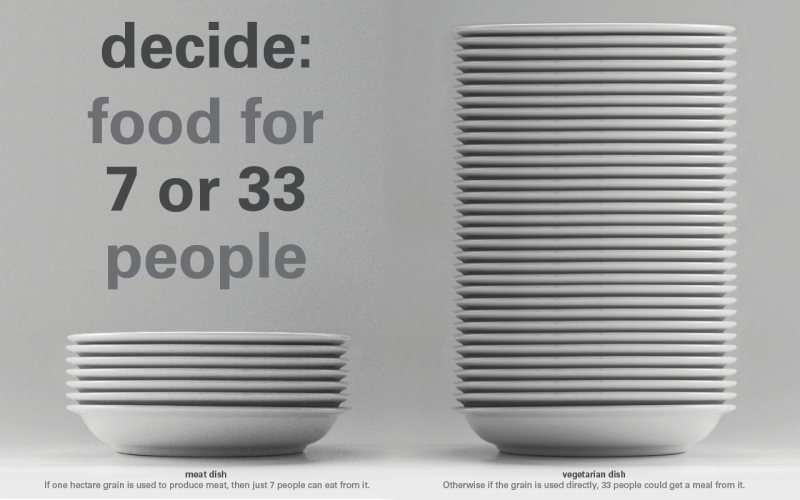Gespeichert von dilemma am

Sub-Headline/Claim
If all people worldwide would stop eating meat the nutrition situation of all people could be improved and our environment could be protected.
Lead-In/Teaser
The consumption of meat is increasing every year. Worldwide a person in average consumed 42.5 kg of meat per year. In Germany the amount of meat eaten with 89.5 kg per person per year is even higher. Thus, a German eats in average 1094 animals in his life. Only 1.6 % of the world population are vegetarians. The global meat production has quadrupled from 1961 to 2009. How does this meat consumption influence the environment and people?
Nut-Graf
The increased meat consumption has an impact on our environment and on the people. It guzzles vital resources, such as grain and water, which are actually needed elsewhere. In parts the global warming is also due to our excessive consumption of meat.
Body
The way from the animal to a piece of meat on our plate is long. It’s journey leaves traces: It starts already before even an animal is visible. To keep all the animals a lot of land space is needed, as well it needs vast fields to grow all the feed. Already 30 % of the total land surface is needed for the livestock farming. Already 60 % of the rainforest has been cleared to get more land area.
During the process of clearing, nitrogen dioxide and carbon dioxide arises, which further promotes the greenhouse effect. This are just two of the greenhouse gases caused by meat production. In addition, the cattle themselves produce methane. Further carbon dioxide is produced by the transport of animals and meat.
In addition the cattle need a lot of feed to be fed. The dilemma picture visualises a frightening statistic. It shows how many people can eat from one hectare grain. If you decide to eat a meat dish then just 7 people can eat from the grain, because the grain is first fed to the animals. Otherwise when everybody decides to have a vegetarian dish, 33 people could get a meal from this hectare grain, because now the corn is used directly.
On the one hand today 79 % of the soy production worldwide is used exclusively for animal feed, on the other hand one billion people worldwide suffer from hunger.
Consequently the meat production consumes valuable food that could be used for other purposes. Probably no one would starve in the world, if we would give up the consumption of meat. There would be enough food for everyone.
However, in practice, this will probably never be possible. Who knows whether the vacant food reaches the people who need it? Everyone can decide by oneself to adjust the own consumption of meat. Even a reduction of one‘s meat consumption would be a beginning and a opportunity to do something for your own health and the health of our world.
Also, the amount of water which is needed for the production of 1 kg of meat is alarmingly: To produce 1 kg of meat 15,500 litre of water are needed, in contrast 1 kg grain only requires 1,300 litre of water.
Ending
If you become aware of the problems of the meat production and the waste of resources during it you would like to dispense immediately from the consumption of meat. In practice, this is easier said than done: If you still live at home it is difficult, because the whole family has to change their behaviour for your new eating habits. Even in the school cafeteria, the dishes for students are often a meat dish. Furthermore what would be a BBQ in the summer, without a juicy piece of meat!?
by Jasmin H.


